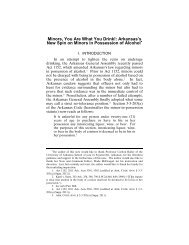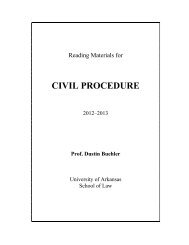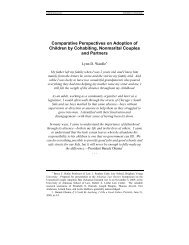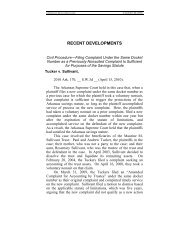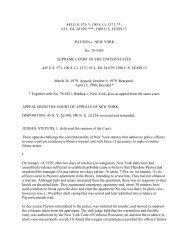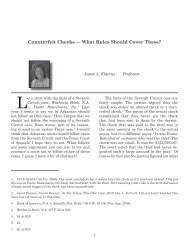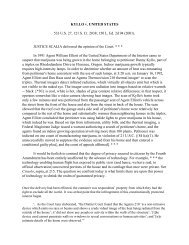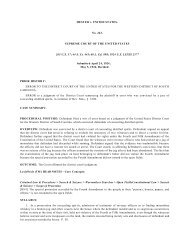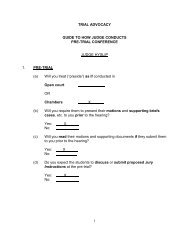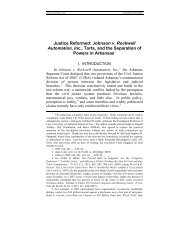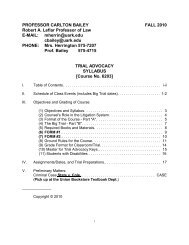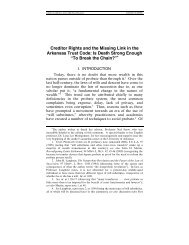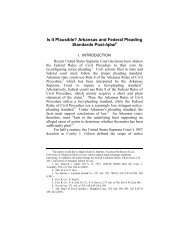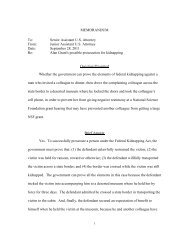Facebook Discovery and the Unbearable Sameness of Internet Law
Facebook Discovery and the Unbearable Sameness of Internet Law
Facebook Discovery and the Unbearable Sameness of Internet Law
You also want an ePaper? Increase the reach of your titles
YUMPU automatically turns print PDFs into web optimized ePapers that Google loves.
62 ARKANSAS LAW REVIEW [Vol. 65:39<br />
he chooses, <strong>and</strong> to make such inquiries as he deems appropriate<br />
<strong>of</strong> any supervisors or employees in <strong>the</strong> plant.” 96 The subject <strong>of</strong><br />
<strong>the</strong> proposed inquiries was not disclosed. 97<br />
The Fourth Circuit reversed. 98 While a response to<br />
ordinary document requests may be compelled based on a<br />
simple showing <strong>of</strong> relevance, <strong>the</strong> court held, “entry upon a<br />
party’s premises may entail greater burdens <strong>and</strong> risks than mere<br />
production <strong>of</strong> documents,” <strong>and</strong> <strong>the</strong>refore “a greater inquiry into<br />
<strong>the</strong> necessity for inspection would seem warranted.” 99 The<br />
Fourth Circuit agreed with <strong>the</strong> defendants that, given <strong>the</strong> lack <strong>of</strong><br />
a stated purpose for <strong>the</strong> inspection, it was likely <strong>the</strong> plaintiffs<br />
wished to have <strong>the</strong>ir expert conduct “roving deposition[s]” <strong>of</strong><br />
<strong>the</strong> defendant’s employees, “taken without notice . . . <strong>of</strong> persons<br />
who were not sworn <strong>and</strong> whose testimony was not recorded”<br />
<strong>and</strong> was not subject to cross-examination, in order to include<br />
those statements in his report. 100 But <strong>the</strong> court held that this<br />
would be improper; <strong>the</strong> plaintiffs could not use an inspection <strong>of</strong><br />
premises to circumvent <strong>the</strong> requirements <strong>and</strong> protections <strong>of</strong> Rule<br />
30 governing depositions. 101<br />
O<strong>the</strong>r courts have followed suit. Courts have expressed<br />
particular concern where <strong>the</strong>re is a possibility that an inspection<br />
will reveal documents or o<strong>the</strong>r information beyond <strong>the</strong> particular<br />
reason for <strong>the</strong> inspection. For example, in Schwab v. Wyndham<br />
International, Inc., <strong>the</strong> court refused to order an inspection due<br />
in part to concerns that “many <strong>of</strong> <strong>the</strong> departments plaintiff<br />
want[ed] to inspect <strong>and</strong> photograph maintain[ed] confidential<br />
<strong>and</strong> proprietary information, such as customer account<br />
information, employee records, tax information, financial<br />
reports, payroll records, sales <strong>and</strong> marketing plans, revenue<br />
goals, <strong>and</strong> investor pr<strong>of</strong>iles.” 102 The defendant was not required<br />
to make an argument that <strong>the</strong>se documents were privileged, only<br />
96. Id. at 906.<br />
97. Id.<br />
98. Id. at 911.<br />
99. Id. at 908. The court’s holding in this regard can be justified, as in fact <strong>the</strong> court<br />
suggested, as required by a careful balancing <strong>of</strong> <strong>the</strong> factors listed in Rules 26(b)(2) <strong>and</strong><br />
26(c), since an inspection is likely to impose more significant burdens on <strong>the</strong> responding<br />
party than a typical document request.<br />
100. Id. at 907, 910.<br />
101. Id. at 909-10; see also FED. R. CIV. P. 30.<br />
102. 225 F.R.D. 538, 539 (D. Colo. 2000).



